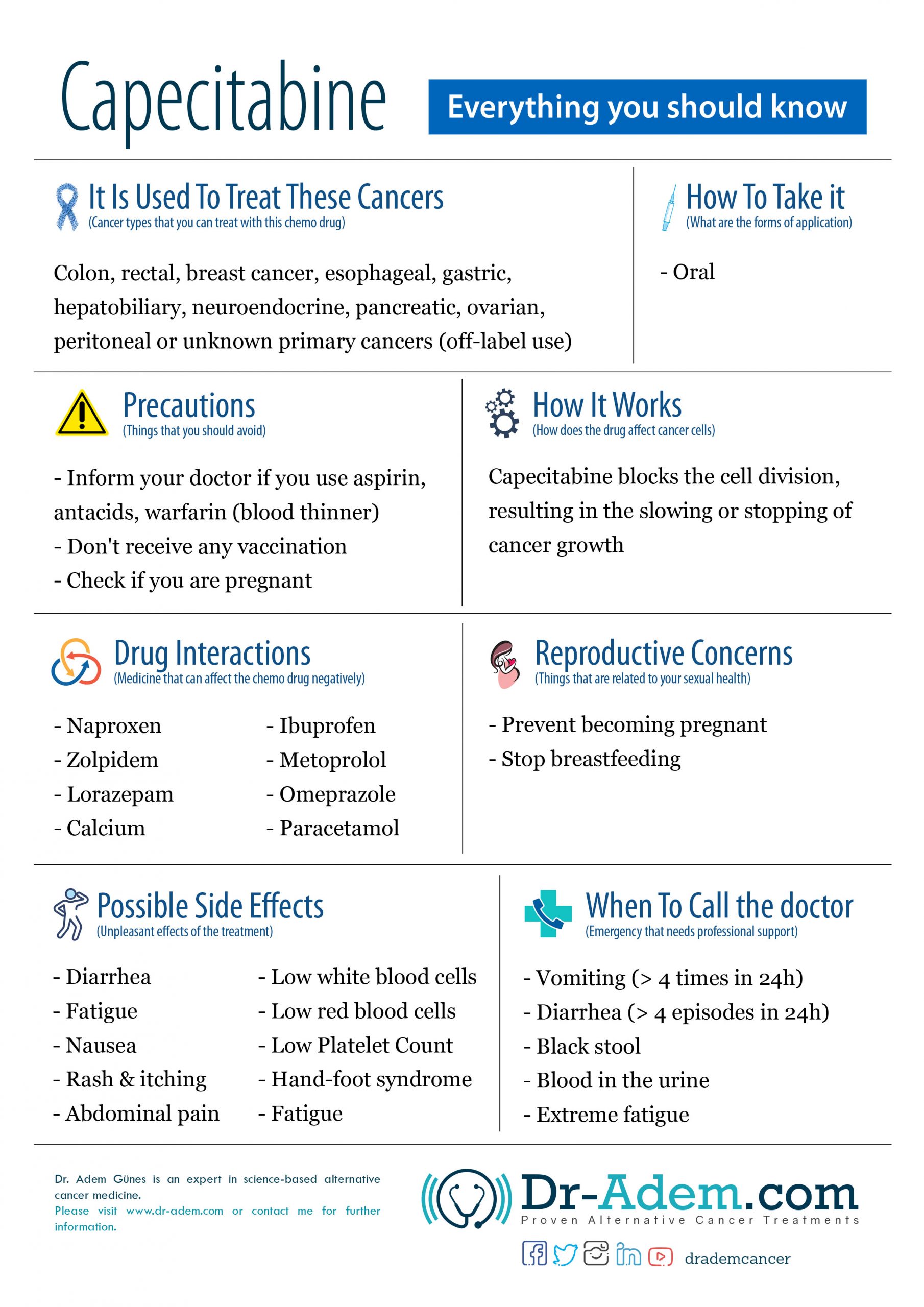Fact Sheet – Everything You Should Know
In this Capecitabine fact sheet, you’ll get to know about the precautions, usage, possible side effects, and the types of cancer that you can treat with this chemo drug.

Embed this Infographic on your site:
<a href='https://dr-adem.com/capecitabine-fact-sheet/'><img src='https://dr-adem.com/wp-content/uploads/2019/11/Capecitabine2-scaled.jpg' alt='Capecitabine Fact Sheet'/></a>Here’s the Capecitabine fact sheet to get detailed information about Capecitabine
It Is Used To Treat These Cancers
(Cancer types that you can treat with this chemo drug)
- Colon
- Rectal
- Breast
- Esophageal
- Gastric
- Liver
- Pancreatic
- Ovarian
- Unknown primary cancers
How To Take it
(What are the forms of application)
- Oral
Capecitabine is absorbed into the bloodstream through the digestive system, converted enzymatically to active 5-FU, and released directly into the tumor.
Usually, the patients are taking capecitabine tablets twice a day (in the morning and evening) for 14 days and then have a seven-day break from taking the tablets.
This 21-day period is one treatment cycle.
Precautions
(Things that you should avoid)
- Inform your doctor if you use aspirin, antacids, warfarin (blood thinner)
The combination of capecitabine and your blood thinner can cause your blood to take longer to clot, which can increase the risk of serious bleeding. - Don’t receive any vaccination
- Check if you are pregnant
Mechanism of Action of Capecitabine
(How does the drug affect cancer cells)
Capecitabine blocks the cell division, resulting in the slowing or stopping of cancer growth.
Drug Interactions
(Medicine that can affect the chemo drug negatively)
- Naproxen (pain killer)
- Zolpidem (sleeping pill)
- Lorazepam (anti-anxiety, anti-seizure)
- Calcium
- Ibuprofen (pain killer)
- Metoprolol (high blood pressure)
- Omeprazole (stomach and esophagus problems)
- Paracetamol (pain killer)
Reproductive Concerns
(Things that are related to your sexual health)
- Prevent becoming pregnant
- Stop breastfeeding
Possible Side Effects
(Unpleasant effects of the treatment)
- Diarrhea; may lead to serious dehydration
- Fatigue
- Nausea
- Rash & itching
- Abdominal pain
- Low white blood cells; white blood cells are important for fighting infection. Any drop can lead to infections
- Low red blood cells; can cause fatigue, shortness of breath
- Low Platelet Count; can cause intestinal bleeding
- Hand-foot syndrome; is a skin reaction that appears on the palms of the hands and/or the soles of the feet
- Fatigue
- Loss of appetite
- Mouth Ulcers (Sores)
- Liver damage
When To Call the doctor
(Emergency that needs professional support)
- Vomiting (> 4 times in 24h)
- Diarrhea (> 4 episodes in 24h)
- Black stool
- Blood in the urine
- Extreme fatigue


